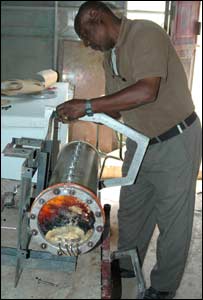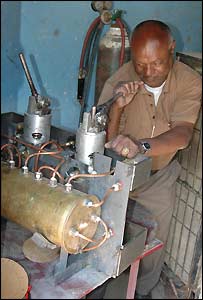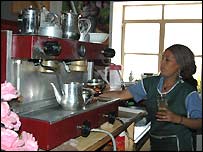Make Coffee, Not War: From weapons of war to great coffee
 (BBC) In biblical times they said “turn your swords into ploughshares”, now in northern Ethiopia a tradesman is bringing the saying into the 21st Century. In his workshop in Mekele, just 120 km from Ethiopia’s border with Eritrea, Azmeraw Zeleke is turning burnt-out shells into cylinders used in coffee machines. Most of the shells are left over from the 1998-2000 war between the two countries. The workshop is made up of three quite small ramshackle rooms that lead from one to another with sunlight coming through the gaps, but it is a hive of activity for Mr Azmeraw and his six staff.
(BBC) In biblical times they said “turn your swords into ploughshares”, now in northern Ethiopia a tradesman is bringing the saying into the 21st Century. In his workshop in Mekele, just 120 km from Ethiopia’s border with Eritrea, Azmeraw Zeleke is turning burnt-out shells into cylinders used in coffee machines. Most of the shells are left over from the 1998-2000 war between the two countries. The workshop is made up of three quite small ramshackle rooms that lead from one to another with sunlight coming through the gaps, but it is a hive of activity for Mr Azmeraw and his six staff.
Tradition
“The shells were dropped in Ethiopia during the war with Eritrea. They were dropped so people hid them in their homes and now they sell them,” Mr Azmeraw says.
He uses old mortar shells, which stand about one metre high, to make his coffee machines.
He cuts off the pointed ends, seals them and puts holes into the aluminium cylinder. The cylinder channels the water, coffee and milk.
He told me he got the idea nine years ago when he was doing maintenance work.
 “I saw some shells being sold for a different purpose and I studied them.
“I saw some shells being sold for a different purpose and I studied them.
“They were used for washing clothes or crushing things. After studying them I came up with the idea of using them as a cylinder for a coffee machine.”
Coffee is a major export from Ethiopia and plays a big role in life.
After meals, the traditional coffee ceremony allows family and friends to get together to share news and discuss the issues of the day.
Coffee shops are also popular.
Fair price
Cafe owner Haile Abraha bought one of Mr Azmeraw’s machines a few months ago.
“I had one other imported machine but this one is much better. It is relatively cheap. The price is fair. The machine is good and it makes good coffee.”
But Mr Azmeraw says it can be difficult to convince people to buy because of the mortar shell.
“These shells have all been used. We all need peace and we don’t want war but once these shells have been used, we should use our skills to do something with them.
“Sometimes I think about the fact they were used for war but I want to change them to do something good. They could be a symbol of war but I am doing something good out of the bad.”
 Since he started production five or six years ago, Mr Azmeraw has sold hundreds of machines – he cannot remember exactly how many.
Since he started production five or six years ago, Mr Azmeraw has sold hundreds of machines – he cannot remember exactly how many.
Each one costs about $1,300. Most of them have been sold to people in the Mekele area.
But in the future he hopes to sell them more further afield – maybe even to coffee shops and restaurants in Eritrea.






